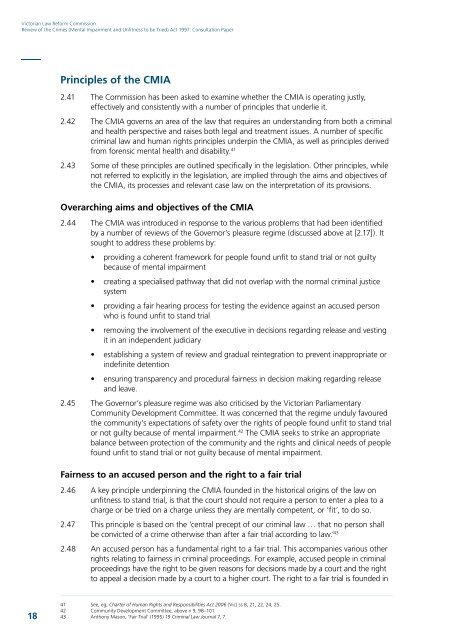Crimes Mental Impairment consultation paper.pdf - Victorian Law ...
Crimes Mental Impairment consultation paper.pdf - Victorian Law ...
Crimes Mental Impairment consultation paper.pdf - Victorian Law ...
You also want an ePaper? Increase the reach of your titles
YUMPU automatically turns print PDFs into web optimized ePapers that Google loves.
<strong>Victorian</strong> <strong>Law</strong> Reform Commission<br />
Review of the <strong>Crimes</strong> (<strong>Mental</strong> <strong>Impairment</strong> and Unfitness to be Tried) Act 1997: Consultation Paper<br />
Principles of the CMIA<br />
2.41 The Commission has been asked to examine whether the CMIA is operating justly,<br />
effectively and consistently with a number of principles that underlie it.<br />
2.42 The CMIA governs an area of the law that requires an understanding from both a criminal<br />
and health perspective and raises both legal and treatment issues. A number of specific<br />
criminal law and human rights principles underpin the CMIA, as well as principles derived<br />
from forensic mental health and disability. 41<br />
2.43 Some of these principles are outlined specifically in the legislation. Other principles, while<br />
not referred to explicitly in the legislation, are implied through the aims and objectives of<br />
the CMIA, its processes and relevant case law on the interpretation of its provisions.<br />
Overarching aims and objectives of the CMIA<br />
2.44 The CMIA was introduced in response to the various problems that had been identified<br />
by a number of reviews of the Governor’s pleasure regime (discussed above at [2.17]). It<br />
sought to address these problems by:<br />
• providing a coherent framework for people found unfit to stand trial or not guilty<br />
because of mental impairment<br />
• creating a specialised pathway that did not overlap with the normal criminal justice<br />
system<br />
• providing a fair hearing process for testing the evidence against an accused person<br />
who is found unfit to stand trial<br />
• removing the involvement of the executive in decisions regarding release and vesting<br />
it in an independent judiciary<br />
• establishing a system of review and gradual reintegration to prevent inappropriate or<br />
indefinite detention<br />
• ensuring transparency and procedural fairness in decision making regarding release<br />
and leave.<br />
2.45 The Governor’s pleasure regime was also criticised by the <strong>Victorian</strong> Parliamentary<br />
Community Development Committee. It was concerned that the regime unduly favoured<br />
the community’s expectations of safety over the rights of people found unfit to stand trial<br />
or not guilty because of mental impairment. 42 The CMIA seeks to strike an appropriate<br />
balance between protection of the community and the rights and clinical needs of people<br />
found unfit to stand trial or not guilty because of mental impairment.<br />
Fairness to an accused person and the right to a fair trial<br />
2.46 A key principle underpinning the CMIA founded in the historical origins of the law on<br />
unfitness to stand trial, is that the court should not require a person to enter a plea to a<br />
charge or be tried on a charge unless they are mentally competent, or ‘fit’, to do so.<br />
2.47 This principle is based on the ‘central precept of our criminal law … that no person shall<br />
be convicted of a crime otherwise than after a fair trial according to law.’ 43<br />
2.48 An accused person has a fundamental right to a fair trial. This accompanies various other<br />
rights relating to fairness in criminal proceedings. For example, accused people in criminal<br />
proceedings have the right to be given reasons for decisions made by a court and the right<br />
to appeal a decision made by a court to a higher court. The right to a fair trial is founded in<br />
18<br />
41 See, eg, Charter of Human Rights and Responsibilities Act 2006 (Vic) ss 8, 21, 22, 24, 25.<br />
42 Community Development Committee, above n 9, 98–101.<br />
43 Anthony Mason, ‘Fair Trial’ (1995) 19 Criminal <strong>Law</strong> Journal 7, 7.

















